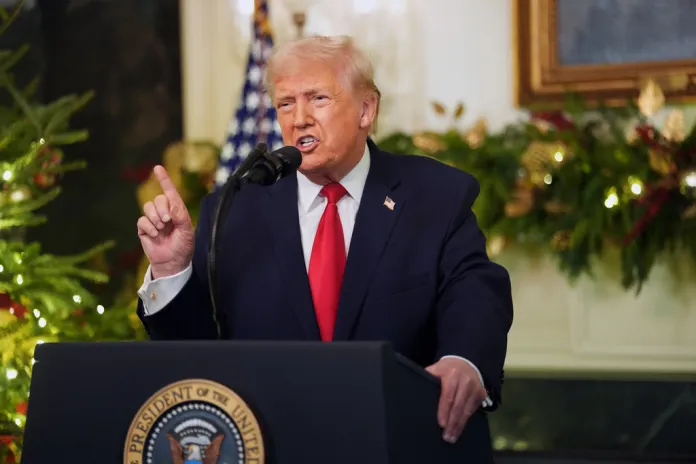Biden’s parting act shows presidential clemency powers need reform – Washington Examiner
The article discusses the implications of President Joe Biden’s use of clemency powers, particularly considering his recent pardons, which echo the concerns he previously expressed about former President Donald Trump potentially abusing his pardon power. Biden, who had warned against the dangers of self-serving pardons during Trump’s presidency, has since granted clemency to several family members and associates, raising questions about impartiality and the standards of justice. Critics,including law professors and political figures,argue that Biden’s actions may undermine his credibility to critique Trump’s past behavior and may normalize such practices in future administrations.
The article emphasizes the constitutional foundation of presidential pardon powers, dating back to concerns from the Founding Fathers regarding its potential for abuse. It also mentions proposals for reforming these powers to limit the president’s ability to grant pardons to family and close associates, pointing to a recent amendment proposal aimed at curtailing the scope of presidential pardons in light of recent events. the discussion highlights a notable shift in norms surrounding presidential pardons, prompting calls for reevaluating the parameters of this power to maintain accountability and fairness in the justice system.
Biden’s parting act shows presidential clemency powers need reform
In December 2020, then-President-elect Joe Biden was very concerned about what outgoing President Donald Trump would do in his final days in office.
Specifically, as he told CNN’s Jake Tapper at the time, Biden was worried that Trump would use the pardoning power to insulate himself, his family, and his associates from any comeuppance for the misdeeds he believed they committed in the previous four years. Such an abuse of the pardoning power, Biden said, would be worrying because of the “kind of precedent it sets and how the rest of the world looks [at] us as a nation of laws and justice.” He went on to say that his Justice Department will “operate independently on those issues.”
As it turns out, Trump never issued a self-pardon. Nor did he pardon any of his children. A few Trump cronies did receive clemency in those final days — Stephen Bannon, Roger Stone, and Paul Manafort were some of the most notable names — but there was not the vast pardon palooza that Biden had predicted.
Or, at least, there wasn’t until this year, when Biden did nearly everything he prophesied that Trump would do, with the only exception being a pardon of himself. Hunter Biden got a pardon, as did Joe Biden’s brothers, sister, and several other presidential relatives. Mark Milley got a pardon. Anthony Fauci got a pardon. And many more. Even more surprising was that these were all blanket pardons, not even specifying any particular crime or accusation that would now be wiped away.
That is not completely unprecedented — Gerald Ford’s pardon of Richard Nixon was similarly sweeping — but the sheer number and breadth of the pardons force the average American to wonder whether there are separate standards of justice: one for Biden’s friends and family and another for the rest of us.
None of this was unconstitutional or illegal. But the breadth and depth of these pardons push hard against the norms surrounding the essentially unlimited power presidents possess to let anyone avoid punishment for violating federal laws. And it is a shocking reversal from a president who indignantly promised on multiple occasions that he would not do this very thing.
And though it feels increasingly quaint to say so, norms do matter, and they should matter to people in both parties. Law professor Jonathan H. Adler noted on X following the Biden family pardons, “It continues to amaze me how much people do not understand how norms constrain behavior, even of bad people. It’s quite clear that Trump does whatever he thinks he can get away with. Norms are part of what determines what he thinks he can get away with.”
Sen. Tim Kaine (D-VA) made the point even more directly: “I think we’re going to have a very hard time critiquing Donald Trump’s improper use of the pardon power because of President Biden pardoning his own family members.”
They’re both right. For all of Biden’s talk in 2020 about how Trump would abuse the pardoning power, it is Biden’s own abuses of that power that will make similar actions by Trump or some future president seem normal — even appropriate. Biden has stretched the norms around pardons to the breaking point.
Pardoning is one of the few fields in which the president has the untrammeled power of a king. Indeed, the power itself was based on the ancient prerogative powers of the English monarch, but unlike the version across the pond, it is written plainly in the text of the Constitution.
Yet even before the Constitution came into force, some of the founding generation thought the pardoning power was too great. Gov. George Clinton of New York, an opponent of the Constitution generally, said it, along with other powers of the presidency, would lead “to the establishment of a vile and arbitrary aristocracy or monarchy.”
Another Founding Father, George Mason of Virginia, said the “unrestrained power of granting pardon for treason” could be “exercised to screen from punishment those whom [the president] had secretly instigated to commit the crime, and thereby prevent a discovery of his own guilt.” We have had warnings from the beginning of the potential for abuse inherent in the power. But prudence by the early occupants of the presidency, and the basic decency of many of those men, created norms around pardoning that kept from establishing that “vile and arbitrary aristocracy.”
Until now, anyway.
There have been many proposals over the years to restrict or even eliminate the president’s power to pardon. The most recent of these was proposed just weeks ago at the start of the 119th Congress by Rep. Steve Cohen (D-TN). Cohen’s argument for his amendment focuses on Trump’s proposed pardons of Jan. 6 defendants, but Biden’s actions in the days that followed make the case even clearer.
Cohen proposes this amendment often — I first wrote about it in 2019 myself — but it has never gained any traction. Recent events may cause that to change.
The Tennessean’s proposed 28th Amendment would bar the president from pardoning himself, his close relatives (and their spouses), members of his administration, and those who worked on his campaign staff. These restrictions are straightforward and easy to interpret and would have eliminated many of the most egregious pardons by Biden.
The text also would ban pardons “for an offense that was motivated by a direct and significant personal or pecuniary interest of any of the foregoing persons; or any person or entity for an offense that was at the direction of, or in coordination with, the President.” It’s hard to disagree with that sentiment. The only problem might be that proving the case would leave some pardons in limbo. For instance, Republicans would say this bars pardons to any of Hunter Biden’s business associates. Democrats might disagree, claiming that there was no corrupt influence network involving the former president and his son.
Still, the risk of harm there is small: A president’s nonrelative, nonemployee, but nonetheless shady associate might have to answer for his crimes. That’s not so bad.
One addition that might finally end the corruption of the pardoning power would be to prohibit presidents from pardoning anyone in their final 90 days in office. Legitimate pardons could still happen, but the people would have a chance to hear about them before the next presidential election takes place. Even a lame-duck president might hesitate before issuing corrupt or self-interested pardons, if only for fear of harming his party’s nominee for the next term.
Biden’s pardon of nonviolent marijuana offenders could probably have still been issued before the election without upsetting any voters who were not already very opposed to him — leniency toward drug offenders is already a known policy position of the Democrats and a popular one. Commuting a convicted cop-killer’s sentence, maybe not.
These are all good reasons on their own, but one other factor argues in favor of an amendment to limit the pardoning power: to demonstrate to the public that it is, in fact, still possible to amend the Constitution on an issue for which there is widespread support.
One of Biden’s other discrediting final acts in office was to announce that the proposed Equal Rights Amendment, which failed its quest for ratification in 1979, was somehow now a part of the Constitution. The president, of course, plays no role in the amendment process, and even most Democrats ignored Biden’s announcement. But futile gestures of this type arise in part out of the idea that it has become essentially impossible to change the Constitution. The last amendment passed in 1992, but even that was an outlier. It had first passed Congress in 1791 and contained no time limit, unlike more recent amendments. The last new amendment, lowering the voting age to 18, passed Congress and the state legislatures in 1971 — more than half a century ago.
It is rare to find a problem with the Constitution that both parties want to fix, but Biden’s pardons have thrust this one to the forefront. Republicans, rightfully aghast at Biden’s actions, can vote for this as a rebuke to the former president’s disgrace. Democrats can do the same out of concern that Trump will do the same thing.
It is a cause that has been discussed and mooted since the Constitution was new. Thanks to Joe Biden and his family, perhaps its time has finally come.
Kyle Sammin is the managing editor of Broad + Liberty.
" Conservative News Daily does not always share or support the views and opinions expressed here; they are just those of the writer."




